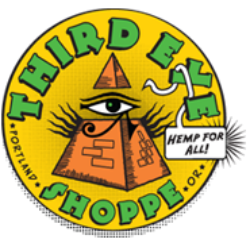
Brixton is an area of South London, part of the London Borough of Lambeth, England. The area is identified in the London Plan as one of 35 major centres in Greater London. Brixton experienced a rapid rise in population during the 19th century as communications with central London improved.

420, 4:20 or 4/20 is cannabis culture slang for marijuana and hashish consumption, especially smoking around the time 4:20 p.m. (16:20). It also refers to cannabis-oriented celebrations that take place annually on April 20.

The Rideau Centre is a three-level shopping centre on Rideau Street in Ottawa, Ontario, Canada. It borders on Rideau Street, the ByWard Market, the Rideau Canal, the Mackenzie King Bridge, and Nicholas Street in Downtown Ottawa. Over 20 million people visit the mall annually. It is the largest shopping mall and the main transit hub in the National Capital Region and the sixth largest mall, by area, in Canada. The Rideau Centre complex has approximately 180 retailers and is connected to a rooftop park, a Westin Hotel, the Shaw Centre, the Freiman Mall and the Major-General George R Pearkes Building.

Marc Scott Emery is a Canadian cannabis rights activist, entrepreneur and politician. Often described as the "Prince of Pot", Emery has been a notable advocate of international cannabis policy reform, and has been active in multiple Canadian political parties at the provincial and federal levels. Emery has been jailed several times for his cannabis activism.

In the Netherlands, coffeeshops are a type of cannabis retail outlet, establishments where the sale of cannabis for personal consumption by the public is tolerated by the local authorities.

Dana Albert Larsen is a Canadian author, businessman, philanthropist and activist for cannabis and drug policy reform. Larsen currently operates businesses and non-profit societies in Vancouver including The Medicinal Cannabis Dispensary, The Medicinal Mushroom Dispensary, The Coca Leaf Cafe, Pothead Books, and the Get Your Drugs Tested centre.

Cannabis political parties are generally single-issue parties that exist to oppose the laws against cannabis.

Washington Initiative 502 (I-502) "on marijuana reform" was an initiative to the Washington State Legislature, which appeared on the November 2012 general ballot, passing by a margin of approximately 56 to 44 percent. Originally submitted to the Washington Secretary of State during the summer of 2011, enough signatures were collected and submitted by December to meet the required 241,153 signatures, sending it to the legislature. When the legislature adjourned without action in April, Initiative 502 automatically advanced to the November 2012 general ballot. It was approved by popular vote on November 6, and took effect over the course of a year, beginning with certification no later than December 6, 2012. Along with a similar Colorado measure, Initiative 502 was credited for encouraging voter turnout of 81%, the highest in the nation.

Mellow Yellow was the oldest cannabis coffeeshop in Amsterdam. It was squatted in 1972 then moved to a new building in 1978. It was forced to close at the start of 2017.

Cannabis in Massachusetts is legal for medical and recreational use. It also relates to the legal and cultural events surrounding the use of cannabis. A century after becoming the first U.S. state to criminalize recreational cannabis, Massachusetts voters elected to legalize it in 2016.

Cannabis on American Indian reservations historically largely fell under the same regulations as cannabis nationwide in the United States. However, the August 2013 issuance of the Cole Memorandum opened discussion on tribal sovereignty as pertains to cannabis legalization, which was further explored as the states of Washington and Colorado legalized marijuana. A clarifying memo in December 2014 stated that the federal government's non-interference policies that applied to the 50 states, would also apply to the 326 recognized American Indian reservations. U.S. Attorney for Oregon, Amanda Marshall, stated that the clarification had been issued in response to legal questions from tribal nations, but that only three unnamed tribes, in California, Washington state, and "the Midwest" had stated explicit interest in legalizing.

Marissa Johnson is an activist who attained notoriety when she interrupted U.S. presidential candidate Bernie Sanders at an August 2015 rally in Seattle. Her activism has been associated with the Black Lives Matter movement. She is a founder of a Seattle-based justice group called Outside Agitators 206, which was disbanded when she became a cofounder of the Seattle chapter of Black Lives Matter around September 2015.

Cannabis in Washington relates to a number of legislative, legal, and cultural events surrounding the use of cannabis. On December 6, 2012, Washington became the first U.S. state to legalize recreational use of marijuana and the first to allow recreational marijuana sales, alongside Colorado. The state had previously legalized medical marijuana in 1998. Under state law, cannabis is legal for medical purposes and for any purpose by adults over 21.
Tokyo Smoke is a Canadian lifestyle brand owned by OEG Inc. that focuses on the legal recreational cannabis industry. The company was co-founded by father and son Lorne and Alan Gertner in 2015.

Weed: The User's Guide: A 21st Century Handbook for Enjoying Marijuana is a 2016 book about cannabis by Seattle writer David Schmader. Schmader is also a writer for The Stranger, a Seattle alt weekly newspaper, where he writes a cannabis column as of August 2016. The book is in part a cannabis cookbook, containing an edibles recipe section.

Third Eye Shoppe, commonly known as The Third Eye, was a head shop in Portland, Oregon's Hawthorne district and Richmond neighborhood, in the United States. The shop was founded in 1987 and owned by cannabis and counterculture activist Jack Herer. His son, Mark Herer, took over as the shop's owner in 2001. The Third Eye closed on March 31, 2017, as a result of declining sales, development of the surrounding neighborhood, increasing health care costs, and increased competition. For nearly thirty years, the shop was associated with Portland's cannabis culture and recreational drug tourism, and was included in Willamette Week's annual "Best of Portland" reader's poll several times.

Cannabis Corner is the first city-owned cannabis shop with its first location at 420 Evergreen Drive, North Bonneville, Washington, USA. As of 2020, the main storefront is located in Stevenson, Washington.

On October 17, 2018, cannabis was legalized in Canada for recreational and medical purposes. It was already legal for medicinal purposes, under conditions outlined in the Marihuana for Medical Purposes Regulations issued by Health Canada, and for seed, grain, and fibre production under licence by Health Canada.

Pike Street is an east-west street in Seattle. It extends from Pike Place above Seattle's saltwater waterfront at Elliott Bay through Downtown Seattle, across Capitol Hill to the freshwater shore of Lake Washington at Lake Washington Boulevard. A segment less than a block long exists at Alaskan Way on Elliott Bay, connected to the rest of the street only by the pedestrian Pike Street Hill Climb; the bottom of the hillclimb under the Alaskan Way Viaduct was the original shoreline of the city before major modification and construction of the Seattle Seawall. It is included in the south-to-north mnemonic "Jesus Christ Made Seattle Under Protest" for the street layout of Seattle.
Draze is a Zimbabwean-American hip hop artist, songwriter, producer and social justice activist. He is known for blending traditional African sounds, marimba, and mbira with hip hop music. He won an Emmy Award in 2022.



















